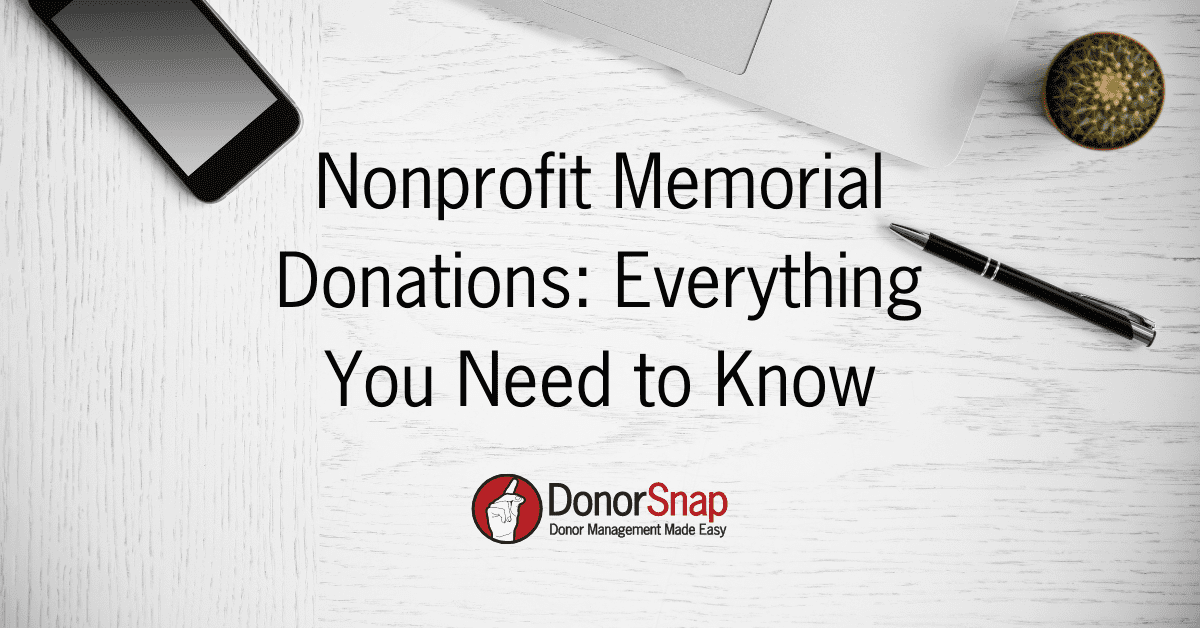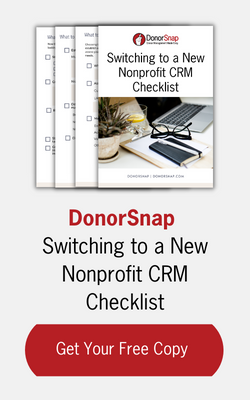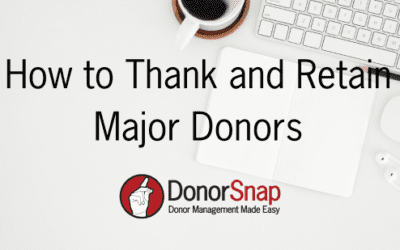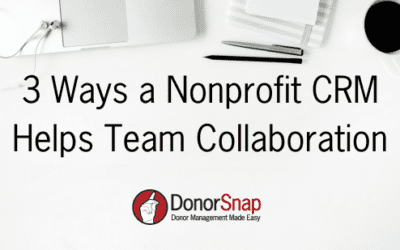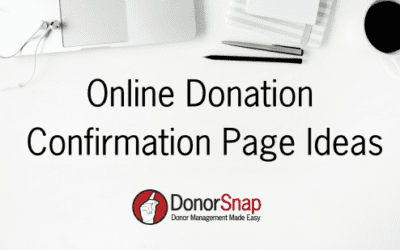This guide will cover everything from nonprofit memorial donation thank you letters to keeping track of memorial donations and how to notify families.
Nonprofit memorial donations are an impactful way to pay tribute to a friend while supporting a grieving family. Charity donation statistics show that 33% of donors worldwide say they give tribute gifts to friends and family.
The memorial donation thank you process is different from your standard acknowledgment process. We will cover everything your nonprofit will need to do when you receive a memorial donation.
What are Nonprofit Memorial Donations?
Memorial donations are donations given in memory of someone who has passed away. A family will ask for memorial gifts instead of flowers in their loved one’s obituary. This could be because their family member passed away from a disease you support. Another reason you may receive memorial donations is if someone had a special tie to your organization. For example, if they were a board member, long-time supporter, or volunteer.

What to do if your nonprofit receives a memorial donation?
- Figure out the person’s connection to your organization
- Establish contact with the family
- Thank the donor
- Notify the family of the donations
1. Figure out the person’s connection to your organization
Generally, your organization will receive memorial gifts for two reasons. You may receive a memorial donation if a person died of a disease your organization supports. For example, if you are an organization that supports Cancer. Another reason for a memorial donation is if the person had a close personal connection to your organization. For example, they could have been a long-time supporter, a board member, or a volunteer.
Knowing the person’s connection to your organization will help you for many reasons. When you thank the donor and notify the family, you should include a personal note about the person who passed. For example, you can share how your organization supports people like their loved one. Or, depending on their connection, how their loved one made an impact on your organization. These details will help you build relationships with the family and donors.
2. Establish Contact with the Family of the Memorial Gift Recipient
It is important to have a contact person in the family for many reasons. First, you will want to notify someone about the memorial gifts and who made them. Also, you may want to share information about the person who has passed with your community. Especially if they had a close connection to your organization, you may want to make an announcement in a newsletter. However, you will want to get permission from the family to do so.
If the family has not given you a contact person, it is important to get your whole team on board. First, search your database for the memorial gift recipient. (Tip: at this time you may want to mark them as deceased.) You may be able to find a connection if you keep track of families in your database. If not, ask board members, volunteers, and staff, if they can help. It is possible, if you do not, someone else in your organization may know the deceased or a family connection. Last, if you still can’t find a connection try googling the person’s name + obituary which should provide you with some family member’s names.
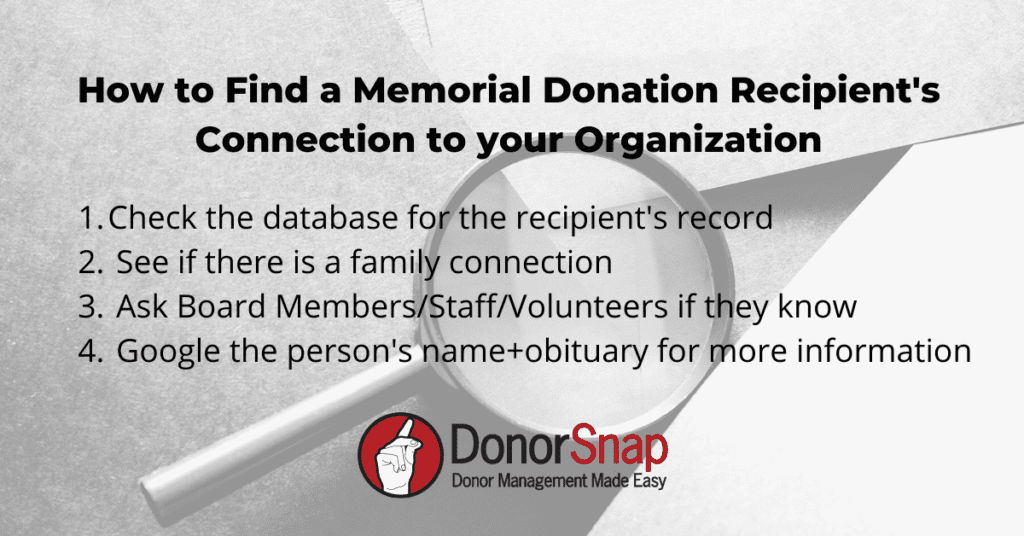
3. Thank the Donor for the Memorial Donation
You will want to thank both the donor, and notify the family of the deceased when you receive a memorial donation. Both of these letters will differ from the standard acknowledgment letters you have in your database. It is a good idea to build a template in your database for acknowledgments of memorial gifts. Here are some ideas for thanking the donor, and notifying the family.
As with any donation, you will want to thank the donor for their gift. You can use some of the wording from your standard acknowledgment letter, with some changes. You will want to thank them for the gift in memory and mention the person’s name. It is nice to include a note about how it was a thoughtful contribution, and let them know you will notify the family of the gift.
Nonprofit Memorial Gift Thank You Letter Template:
Dear Name,
Thank you so much for your gift of (gift amount) in memory of (person’s name). Your donation is a thoughtful way to honor the life of (person’s name) and their connection to (your organization). We notified the family of your gift.
4. Notify the Family of the Memorial Gift
You will also want to notify the family of all the gifts received in memory of their loved one. It is important to notify them as soon as you can, so be sure to include this in your standard acknowledgment process. You should thank them for choosing your organization as recipients of the memorial gifts. Then, let them know the names and contact information of the people who donated. Generally, it is not best practice to include the amounts of each donation. If the family asks, you could include a grand total of all donations received, instead of individual contributions.
Nonprofit Memorial Gift Notification Letter Language Idea:
Dear Name,
Thank you so much for choosing (your organization) to be a recipient of memorial gifts for (deceased’s name). This is a thoughtful way to remember your loved one while supporting our mission, which was near and dear to their heart. (Include info on how their loved one helped your organization over the years or include information on how your organization helps people as it relates to them).
We received donations in memory of (person’s name) from the following individuals:
Donors Name Donor’s Address Donor’s Contact Information
Best Practices for Managing Memorial Donation Acknowledgements
1. Keep Track of Your Memorial Donations
It is important to track all of your memorial donations by specifically labeling them as a memorial. Doing so will help you when you notify families of donations made to their loved ones. Also, you will need this information when publishing your annual or gratitude report.
To help your nonprofit keep track of memorial donations, be sure there is an option on your donation forms to distinguish if the gift is in memory. You should have a check box on your remittance envelopes that has space to leave the person’s name. If you are collecting online donations, include a memorial gift check box with space for the person’s name on your donation form.
Learn more about how to track memorial gifts in DonorSnap here.
2. Have a Clear Distinction Between Other Tribute Gifts
It is important to distinguish between nonprofit memorial gifts and other tribute gifts. Although memorial gifts are more common, people will also make gifts in honor of living people for birthdays or other celebratory reasons. Have a system in your database to separate memorial gifts from other tributes. Generally, nonprofits will label memorial gifts as “in memory of” and other tributes as “in honor of”.
3. Follow Up with Donors with Personalized Appeals
When you receive memorial gifts, chances are you will receive donations from first-time donors. Do not throw them into your general asking pool for the following year. Instead, think of a meaningful follow-up that may result in a repeat gift. At the anniversary of their gift, send a personalized appeal, asking if they want to continue supporting the legacy of their friend or loved one.
4. Follow Up with Family about Memorial Gift Impact
It is important to also follow up with the family. You should contact them with the names and information of everyone who has given, as soon as you can. After that, an additional follow-up letter with how the memorial gifts helped your organization will have a big impact. It may feel awkward to contact a grieving family, but it is important to let them know how much the memory gifts made an impact.
Conclusion
Memorial donations are a thoughtful way for family members and friends to celebrate a passed loved one. When your nonprofit receives a memorial donation they should take the following steps:
- Find the person’s connection to your organization
- Establish Contact with the Family
- Thank the donors
- Notify the family of the donations
The following best practices will help your organization handle memorial donations.
- Keep track of nonprofit memorial donations in your donor database
- Have a clear distinction between other memorial gifts
- Follow up with personalized appeals
- Follow up with the family on the impact of memorial gifts
Receiving memorial gifts can be a delicate situation. But you will have success if you follow these steps while utilizing the best practices. Also, these tips will help you support a grieving family and build relationships.
